News from Maison de la Gare
Who are the Talibés? Why Do They Beg?
Tweeter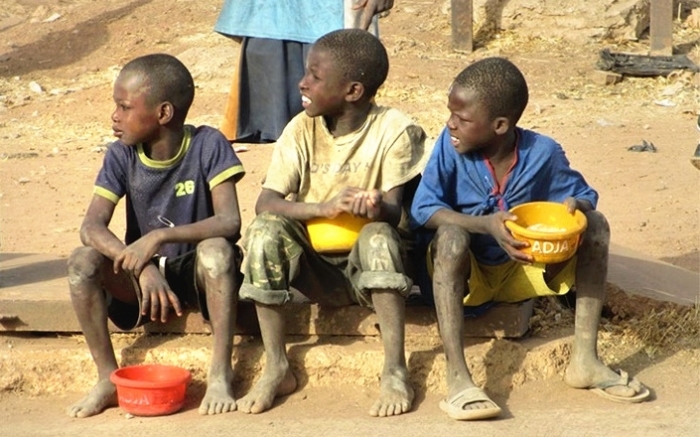
Rowan Hughes shares her understanding of this complex issue, after eight years involved with Maison de la Gare and the talibé children
Across the globe and throughout history, certain vulnerable groups have been unfairly exploited.
And their exploiters in positions of power have taken advantage of this and the
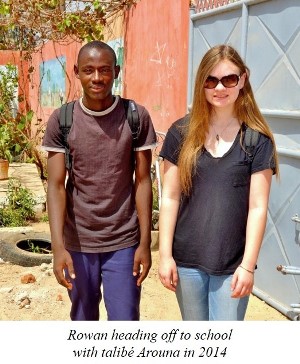 law has turned
a blind eye.
law has turned
a blind eye.
The Senegalese talibé system has its roots in the 14th century but it has evolved dramatically
since about the 1960s, from a respected system of religious education and character building
into a fraught system of exploitation. Today, predominantly rural families entrust their sons
to urban-based Islamic teachers known as marabouts. However, instead of receiving the
anticipated Islamic education, tens of thousands of these “talibé” children typically
experience conditions of deprivation, extreme corporal punishment and being forced to beg for
daily quotas of money as well as their own food for 8 to 10 hours a day. The United Nations
considers the talibé system today to be a form of modern slavery.
Marabouts
Marabouts are the principal perpetrators of talibé abuses. Some of them have recruitment
systems that extend to villages in neighboring countries, escalating the talibé system to
international child trafficking. Many marabouts force their talibés to beg for their own
personal enrichment, but it was not always this way.
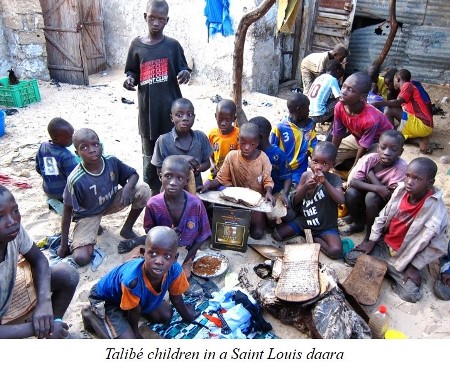
The talibé system originated as one of the first formal systems of education in West Africa,
based on a trust relationship in which marabouts were responsible to and supported by local
populations. All talibés, whatever their origin or family wealth, practiced a moderate
amount of begging, not to enrich the marabout but rather to teach them humility. Daaras
were in the community or a nearby village where their proximity to home allowed talibés
and their families to remain in close contact. Families made small financial contributions
to the daara and children regularly returned home to eat, wash, clean their clothes, and
to spend time with their families.
Just over half a century ago when drought worsened in Senegal, severe impoverishment
resulted in rural villages. This induced many marabouts to move their daaras to
relatively more prosperous cities. Rising poverty in the villages
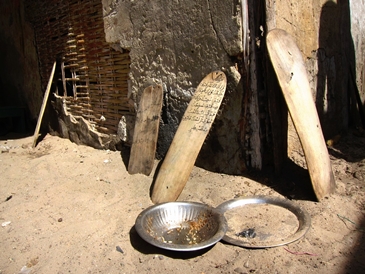 made it difficult for
families to continue to financially support the marabouts and, after the transition to
cities, parents ceased to play an active role in supporting their sons. This migration
of daaras from rural villages has expanded to become thousands of daaras in cities across
Senegal today, where marabouts use forced begging by the children as their primary means
of support.
made it difficult for
families to continue to financially support the marabouts and, after the transition to
cities, parents ceased to play an active role in supporting their sons. This migration
of daaras from rural villages has expanded to become thousands of daaras in cities across
Senegal today, where marabouts use forced begging by the children as their primary means
of support.
Civil Society
Civil society’s role is key to understanding why forced begging persists. Senegalese
citizens contribute to condemning the talibé system to be a classic poverty trap. They
coexist daily with the talibés and are often indifferent to their distress. Even worse,
most citizens donate generously to talibé begging bowls but, unfortunately for the talibés,
this generosity only feeds the system which exploits them.
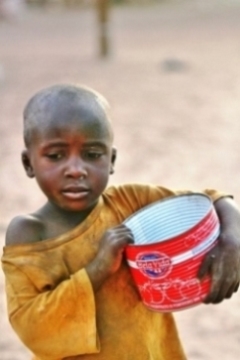
Senegalese support of the talibé system is deeply rooted in the country’s religious and
cultural history. Koranic schools have been a key symbol of Muslim identity in West
Africa since the 14th century and marabouts, as the leaders of these schools, have an
unusually strong influence. An emphasis on rote learning and Muslim duty reinforces
individuals giving to the talibés less out of compassion than from societal expectations,
without examining too closely who or what they are really giving to. Some of the abuses
experienced by talibés in daaras are not considered as offensive to Senegalese society
as they may be to international organizations that advocate for children’s rights.
Further, some of the most serious abuses happen out of the public eye and are thus
easy to overlook.
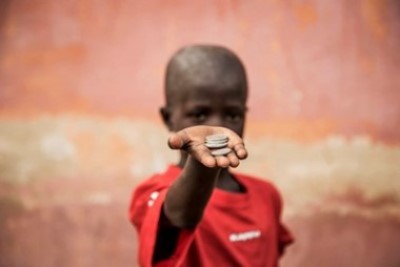
Civil society is a critical lever of potential change; if individuals stopped giving
to the talibés, the system would quickly come to an end.
Other Actors
The state has had a dual role in perpetuating the talibé system: not enforcing
forced-begging laws, and indirectly legitimizing the begging daara system as an
educational system. Senegal’s penal code long ago criminalized forced child begging.
However, only a handful of cases have been prosecuted in a landscape of thousands of
daaras where children are forced to beg. This governmental laxity reflects the
political influence of the marabouts, the overwhelming scope of the problem, and
scarce resources. Despite political rhetoric, enforcement of forced begging laws
remains elusive.
There are many in Senegalese society who call for change. Some civil society
organizations, Maison de la Gare being a leader among them, work to educate people
about the severity of the conditions faced by talibés. These organizations have
had an important impact in improving the children’s living conditions and prospects
for the future, and they advocate tirelessly for an end to the talibé begging system.
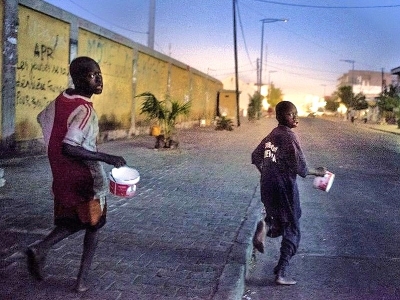
The international community is another actor that could play a stronger role in
encouraging the state to change its behavior with respect to the talibé system.
For example, by pressuring government leaders with respect to human rights for
children and supporting the civil society organizations that work to end forced
begging, such as Maison de la Gare.
Families of talibé children are important actors as well. If parents stopped sending
their children to be talibés, the system would fall apart. However, the importance
of Islamic education and the influence of marabouts are particularly powerful with
rural and often uneducated parents. Furthermore, when there are no local schools,
families have very few options if they want their children to receive an education,
and the promise of an Islamic education in an urban daara is often the only option
available. Finally, some parents are simply unaware of the severity of the conditions
of deprivation, forced begging and abuse experienced by their children.
The unintended consequences of parents sending their boys from rural villages to the
cities are far reaching and severe for society, not just for
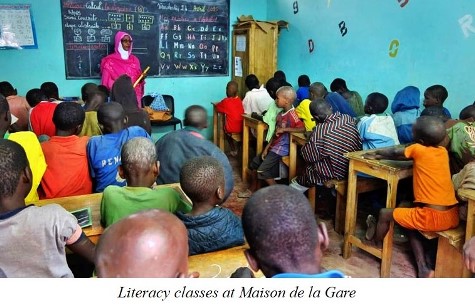 the talibés. A visitor
to many rural villages in Senegal that have sent boys to be talibés in the cities will
observe a dramatically disproportionate number of girls. It is common in these
villages for girls to marry as young as 13 or 14 to older men who already have other
wives. The lack of schools in rural villages not only encourages the talibé system
but promotes polygamy, child marriage and female illiteracy.
the talibés. A visitor
to many rural villages in Senegal that have sent boys to be talibés in the cities will
observe a dramatically disproportionate number of girls. It is common in these
villages for girls to marry as young as 13 or 14 to older men who already have other
wives. The lack of schools in rural villages not only encourages the talibé system
but promotes polygamy, child marriage and female illiteracy.
Another distressing unintended consequence is the inability of talibés to become
productive members of Senegalese society. Issa Kouyaté, Maison de la Gare’s founder
and president, has long understood this. His primary objective for Maison de la Gare,
apart from ultimately ending forced begging in Senegal, is to provide means for talibé
youth to learn to become successful and productive members of society.
What can we do?
The trap that talibé children experience is a result of many complex factors.
Marabouts, civil society, the talibés’ families, government, and the international
community all are actors who play a role, either through action, or through lack of
action that perpetuates the horrors of the talibé system. Influencing parents to
keep their children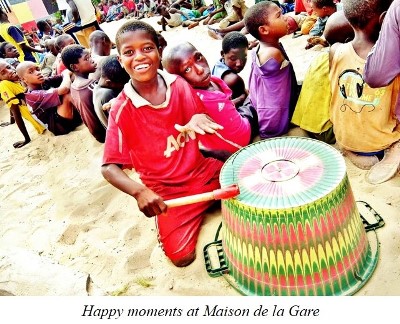 at home by building schools in rural areas and encouraging daaras
to return to their rural roots have significant potential, as does pressure and
targeted aid from the international community.
at home by building schools in rural areas and encouraging daaras
to return to their rural roots have significant potential, as does pressure and
targeted aid from the international community.
We can also work to establish an effect collaboration between parents, marabouts,
talibé children, civil society, and organizations like Maison de la Gare. Direct
communication between all these stakeholders is essential if we are to achieve true
protection for the children. Together, we can dismantle the illegal practices of
the exploiters. Only such a collaboration can bring about real change for these
thousands of abused children.
Importantly for our readers, donations made through grassroots organizations such
as Maison de la Gare offer more than just hope. They offer the potential
for real change.
__________
Rowan Hughes first visited Maison de la Gare in 2012 at the age of 14. Since
that time, she has made nine more trips to Saint Louis as a volunteer and is now
completing a degree in International Development at the University of Guelph
in Canada.

